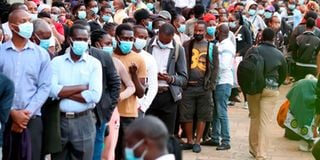Deaths, ICU admissions rise in counties outside lockdown zone

Residents of Nairobi queue for matatus in the CBD on April 26, 2021 without observing social distancing rules.
What you need to know:
- In Murang’a County, ICU wards started registering mass intakes last Saturday.
- Elgeyo Marakwet, Kitui, Mombasa, Murang’a, Laikipia, Kericho,Uasin Gishu are reporting sharp rise in new infections.
The coronavirus tide in the country has continued to rise steadily as the positivity rate remains above 10 per cent, making it difficult for the government to ease movement and public gathering restrictions imposed one month ago.
The current positivity rate is double the World Health Organization recommended threshold of below five per cent for re-opening of the economy.
Public Health experts attribute the surge in infections and deaths to peoples’ apathy to the set public health measures coupled by a false sense of protection drawn from the recent vaccination drive.
Dr Moses Masika, a virologist at the University of Nairobi, says the low number of vaccinations estimated at below one million, means it is still too early to bank on immunisation to reduce infections, hospital admissions and deaths.
Approximately 800,000 Kenyans have received at least one dose of the Covid-19 vaccine. This coverage is still a far cry from the targeted 25 million people, meaning that the impact of inoculation will not be felt soon.
Latest data shows that the burden of the disease is gradually shifting away from beyond the five counties under lockdown, which in March accounted for more than 70 per cent of the country’s caseload.
Burden of infection
In the past one month, the burden of infection has expanded from the five counties of Nairobi, Kajiado, Kiambu, Machakos and Nakuru to other counties like Elgeyo Marakwet, Kitui, Mombasa, Murang’a, Laikipia, Kericho and Uasin Gishu, which are now reporting a sharp rise in new infections.
Isolation and Intensive Care units are fast running out of space as more patients continue being admitted to various hospitals with Covid-19 symptoms.
One of the worst hit counties is Murang'a, which has recently featured prominently in the national daily briefings on Covid-19 by the Ministry of Health — in some instances coming second to Nairobi in number of new infections.
According to the county’s Health Executive Joseph Mbai, 12 cases were admitted to ICU on Saturday, the highest number ever since the pandemic was reported in March last year.
In Kakamega County, the isolation ward in Mumias town has been re-opened after the number of Covid-19 patients in critical condition admitted to the County General Hospital shot up.
"We don’t have more beds to accommodate patients at the county general hospital, and the situation is getting desperate by the day," said Health Executive Collins Matemba.
Run out of isolation beds
In Tharaka-Nithi, Chuka County Referral Hospital, the main health facility in the county, has run out of isolation beds following a drastic increase in coronavirus infections in the region. Nyeri County is also grappling with a shortage of isolation beds in its facilities.
In Kisii County, more than 50 Covid-19 patients have been admitted to the main isolation ward at the Kisii Teaching and Referral Hospital. Public Health director Richard Onkware said the admissions were the highest since the first case was reported in the region last year.
According to monthly situation analysis, infections rose from 4,315 cases in January to 28,085 in March. As of April 22, the number of infections stood at 20,334.
Fatalities have been on the rise, from 93 in January and February to 297 and 407 in March and April respectively.
Counties in Nyanza and Western region are also grappling with the latest surge in Covid-19 infections, with hospitals in the two regions reporting an increased number of admissions.
In Mt Kenya region, most of the counties have reported running out of isolation beds.
Reporting by Elizabeth Merab, Benson Amadala, Victor Raballa, Elizabeth Ojina, Benson Ayienda, George Odiwuor and Derick Luvega, Alex Njeru and Mwangi Muiruri





